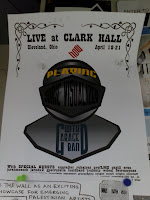 |
| THATCamp Games: epic win. |
I drafted this post while flying back to Albany NY from Cleveland, where I participated in the second THATCamp Games unconference, hosted by the Baker-Nord Center for the Humanities at Case Western Reserve University. If you're unfamiliar with the concept of the unconference, imagine an event which combines the scholarly rigor of an academic conference, the energy and focus of a trade show, and the gloriously unselfconscious enthusiasm and fun of a sci-fi convention. THATCamps happen all over the country, with different topics and themes, so check out their main site if you want to find out more: chances are good there'll be one in your part of the country, on a topic relevant to your discipline.
I attended last year's (inaugural) THATCamp Games at the University of Maryland University College, and learned an incredible amount about game design in education - just at the time I was about to teach my own Dungeons and Discourse intro philosophy course for the first time. The experience was powerful enough that I knew I'd be back again; and indeed, I planned to attend this year as soon as the dates and location were announced. But the plot thickens: the organizers contacted me and asked me to run a workshop on the first day. How cool: not only was I attending again, but now I had the chance to share some of my own ideas and experiences. My workshop addressed the topic of using an LMS as an edugaming platform, something which has a broad appeal to faculty who work within such software.
The range of sessions ran across three tracks - Course Hacks, Digital Hacks, and Cardboard Hacks - from RPG design for courses to gaming assessment to physically constructing board games to brainstorming opportunities for growing institutional support for edugaming. Our keynote speaker, Prof. Anastasia Salter, presented a fascinating talk on the history and future directions of the field, and I got the chance both to reconnect with colleagues I'd met last year and to meet and collaborate with many new colleagues with similar and/or complementary interests and projects.
 |
| One of the first cryptic clues. |
Lest this start sounding like a generic panegyric to a humdrum conference, however, let me remind you that the theme was Games ... and we surely did practice what we preach. There was a great deal of time, space, and opportunity built into the event - quite intentionally! - so that we could run a rousing 3-hour session of Battlestar Galactica, or a quick half-hour of Pandemic. And overlaying the entire event was a mysterious ARG-style meta-game, with an ancient threat, a mysterious Order, and cryptic clues scattered across multiple media, from videos to flyers to tweets to exhibits in the Cleveland Museum of Art.
I've said it before, and it bears repeating: deep engagement and motivation are exactly the things we always say we want in our classes - and these are exactly the things we can approach effectively by understanding and applying game design principles to what we do. I can't wait to start planning for my next course using what I've learned from my colleagues at this year's THATCamp Games!
